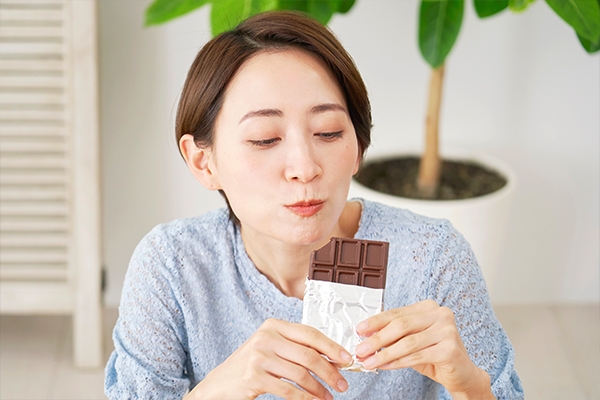Why Is Chocolate Good for You?

Chocolate has a bad reputation because of its high fat and sugar content. However, there's no need to feel guilty when biting into a piece of chocolate. Behind its negative reputation, such as causing acne, obesity, high blood pressure, diabetes, or toothaches, this delicious snack has many health benefits.
Chocolate is made from cacao beans. Theobroma cacao, the cacao tree, originates from the tropical forests of Central America. Cacao beans are eaten by millions of people worldwide due to their unique taste. This is because chocolate has a sweet, bitter, or, a combination of both flavors.
About 2,500 years ago, the Maya people began planting the cocoa tree. The Maya were recognized as farmers of cocoa beans during that era. After grinding the beans, they added red pepper, vanilla, and other spices to make a cool, hot drink.
The Aztecs continued the tradition of consuming chocolate drinks. This drink was then discovered by the Spanish in the 1500s and brought it to other regions throughout the world.
There are three main varieties of cacao plants: Criollo from Latin America, Forastero from Africa, and Trinitario from the Caribbean. Cacao Criollo is known as fine flavored.
Criollo represents only 0.01% of cacao cultivated in the world. Chocolate comes in various forms, including chocolate bars, chocolate paste, cocoa powder, and many more.
Types of chocolate
Around the world, people recognize three types of chocolate: dark chocolate, milk chocolate, and white chocolate. Dark chocolate is a type of chocolate with the highest cocoa content. It has a dark color and tends to have a bitter taste.
To counter this bitterness, manufacturers usually add vanilla, sugar, or artificial sweeteners. This product does not contain milk. In Indonesia, chocolate is categorized as dark chocolate if it contains a minimum of 35% cocoa solids.
Milk chocolate has a lighter color than dark chocolate. It tastes sweet and has a creamy texture. White chocolate, on the other hand, is white rather than brown. Its taste is not "chocolaty" because its main ingredient does not include cocoa solids without fat, which gives chocolate its brown color. The natural color of cocoa fat in this chocolate is white. Its sweet, creamy flavor results from this.
Unfortunately, only dark chocolate has health benefits out of these three varieties. Chocolate is still chocolate, however. Both sugar and saturated fat levels are high. To get the benefits of dark chocolate, limit your daily intake to 100 grams. No more!
Benefits of chocolate
Basically, chocolate essentially contains various minerals and beneficial polyphenolic compounds, such as antioxidants and flavonoids.
It is rich in flavanols, such as epicatechin and catechin, as well as anthocyanins and phenolic acids. These compounds help protect cells from inflammation, improve brain function, and enhance immune and cardiovascular health.
The higher the cocoa content in chocolate, especially in dark chocolate, the greater its potential health benefits due to antioxidants. Dark chocolate contains less fat and sugar, so be sure to check the label.
1. Reducing cholesterol levels

One study, published in The Journal of Nutrition, suggests that consuming chocolate might help reduce Low-Density Lipoprotein (LDL) cholesterol, also known as "bad" cholesterol.
This is because chocolate bars contain plant sterols (PS) and cocoa flavanols (CF) that can lower cholesterol and blood pressure. Regular consumption of chocolate bars that contain PS and CF may support cardiovascular health by lowering cholesterol and improving blood pressure.
2. Preventing cognitive decline

Scientists from Harvard Medical School have suggested that drinking two cups of hot chocolate every day could help keep the brain healthy and reduce memory decline in the elderly. Hot chocolate helps improve blood flow to parts of the brain.
3. Improving heart health and reducing stroke risk

Eating up to 100 grams of chocolate every day may be linked to a lower risk of heart disease and stroke. The antioxidants in dark chocolate help lower bad cholesterol levels and prevent plaque buildup in the arteries, while the flavanols in chocolate are good for reducing blood pressure and improving blood flow. Moderate consumption of dark chocolate can lower the risk of heart disease and reduce inflammation.
4. Boosting energy

Compounds in dark chocolate, such as theobromine, have effects similar to caffeine. They are beneficial for increasing energy and overall vitality, as well as enhancing mood and alertness.
5. Good for skin health

Chocolate is rich in many minerals including copper, iron, magnesium, and manganese. Manganese supports collagen production, and protein helps maintain healthy skin, making it look vibrant and fresh.
Although eating too much chocolate might have harmful effects, it also offers many health benefits. Some types of chocolate can be high in calories count due to its sugar and fat content. High sugar content in chocolate can trigger dental problems.
Therefore, if you are trying to slim down or maintain your weight, you should limit your chocolate consumption. Also, read the labels of your favorite chocolate to learn more about their ingredients.
Some people may also experience migraines when consuming excessive chocolate. This is because of the content of tyramine, histamine, and phenylalanine found in cocoa.
Choose high-quality chocolate, especially dark chocolate with a cocoa content of 70% or higher. Dark chocolate typically contains less sugar. Generally, the darker the chocolate, the lower the sugar content.



